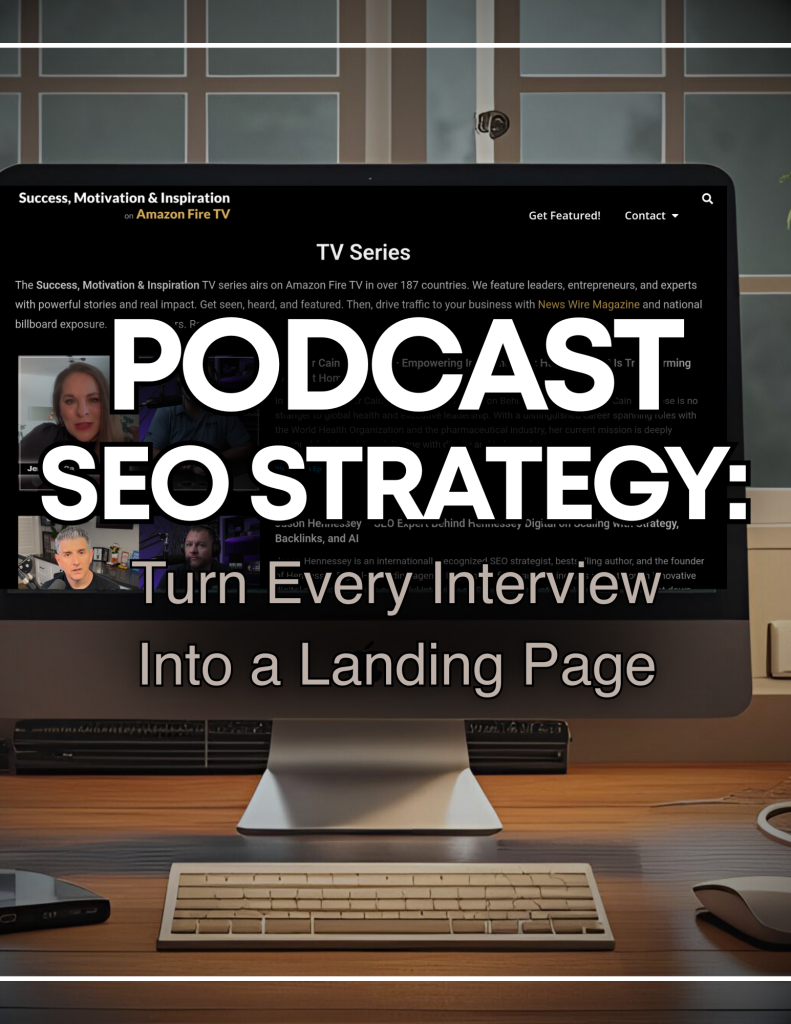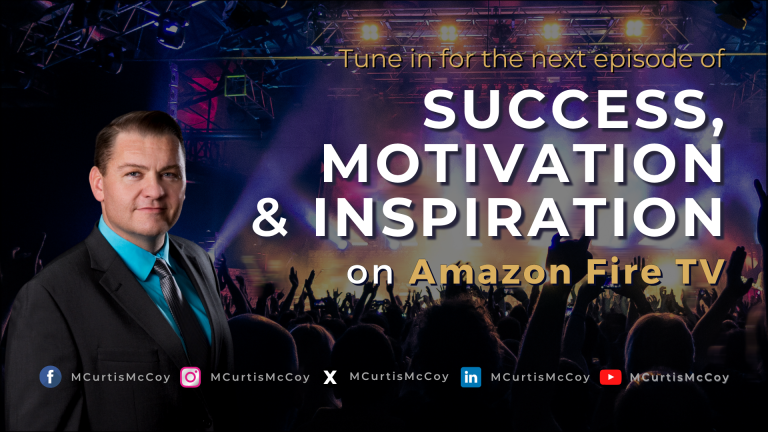Many new podcasters upload episodes to Spotify, Apple Podcasts, or YouTube, then stop. That’s why most podcasts fail to grow. If you’re only posting on third-party platforms, you’re building their brand, not yours.
Think about how often you hear a new podcast host say, “listen to my podcast on (name of platform)” instead of making sure they own their traffic. Terrible podcast SEO strategy, right? These platforms can shut you down at any time if you don’t own or control your traffic.
To grow your audience and own your traffic, you need to create an SEO-friendly landing page for every guest. This podcast SEO strategy can turn good interviews into long-term traffic, brand authority, and ongoing visibility.
You’re Missing Out on Free Search Traffic
Google doesn’t rank podcast episodes. It ranks web pages.
If someone searches for a guest you’ve interviewed—especially if they’re well-known—and your site doesn’t show up, that traffic is going to someone else’s platform.
You had the conversation. You did the work. But without a dedicated landing page, you’re missing out on real, targeted search traffic that could have introduced listeners to your brand.
Podcast SEO Strategy
Example:
If you interviewed M. Curtis McCoy, a personal branding expert and the President of News Wire Magazine, you’d want to rank when someone Googles:
- “M. Curtis McCoy podcast interview”
- “M. Curtis McCoy, President of News Wire Magazine”
- “M. Curtis McCoy paid media strategies”
- “M. Curtis McCoy personal branding expert”
Why You Need to Own the Traffic
Earlier this year, M. Curtis McCoy was ranked the #1 guest on Matchmaker.fm, with 183 podcast appearances in just 90 days.
Out of all those shows, only four podcast hosts created search engine optimized landing pages for their interviews with Curtis. The other 179 had great conversations, but they ultimately yielded no long-term benefits.
That’s the problem most podcasters face. They record interviews, publish audio, and move on, without ever creating content that brings traffic back to their own site. Why are you working so hard without the potential of getting paid at some point?
Learn this podcast SEO strategy so you can turn podcast interviews into search engine optimized landing pages that generate new subscribers and revenue potential.
Your Goal With Every Guest Interview
- Create an SEO-friendly landing page that ranks for the guest’s name
- Capture long-tail search traffic using the guest’s name and niche topic
(Long-tail keywords are specific 3–5 word phrases with lower search volume but higher conversion rates, often used by users ready to buy or using voice search.) - Build topical authority for your podcast website
- Give your guest a reason to link back to you
- Convert each interview into evergreen search content
Step-by-Step: Turn Each Guest Into an SEO Magnet
This same Podcast SEO Strategy applies to any guest you feature on your show, but we’ll use M. Curtis McCoy in this example.
1. Upload the Podcast Interview to YouTube
The first step in this podcast SEO strategy is to ensure that your guest’s full name is included in the video title, tags, and description.
Example Title:
“M. Curtis McCoy Shares 17 Paid Media Tips for Personal Branding”
In your YouTube description, include:
- Link to the guest’s website (e.g.,
https://MCurtisMcCoy.com) - Link to the landing page you’ll create for this episode (e.g.,
https://YourSite.com/MCurtisMcCoy/)
Recording, exporting & uploading in 4K has been shown to boost YouTube ranking. If you have a camera that can record in 4K, that may help your episode rankings on YouTube.
Pro Tip: If you upload and save as a draft, you can ask ChatGPT to write an SEO-friendly YouTube description and title after step #3.
2. Copy the YouTube Transcript
Here’s a trick to make implementing this podcast SEO strategy much easier. We’ll be using the video transcript and ChatGPT to write the article!
How long does it take YouTube to create a transcript? Timing may vary depending on the video’s length, complexity, and caption settings. YouTube usually creates automatic captions within a few hours to a day after upload.
To extract the transcript from your video:
- Go to your YouTube video or draft
- Click the three-dot menu under the video
- Select “Show Transcript”
- Copy the entire transcript to your clipboard (Ctrl + C on Windows or Command + C on Mac)
3. Use ChatGPT to Write an SEO-friendly Blog Post for Each Episode
If you’re using ChatGPT Plus, use this FREE custom GPT tool:
https://chatgpt.com/g/g-IG2pCn0Ni-video-captions-to-blog
Paste your transcript and click ‘Enter’ to write an SEO-optimized article outline based on the video transcript you pasted into the custom GPT. When the custom GPT asks you if you want it to write the article based on the outline, say yes.
If you’re using the free version of ChatGPT, here’s a script you can copy and paste to have it convert your podcast interview transcript into an article.
Video Transcript to SEO Friendly Article Prompt
This podcast SEO strategy will save you hours per podcast episode.
(Copy & Paste this prompt into ChatGPT, followed by your video transcript from YouTube)
I’m going to paste a full transcript from a YouTube podcast interview.
- Do not include any preamble, explanations, or background information.
- Do not include pretext or context.
- Do not include references, sources, or citations unless I explicitly provide the link.
First, ask me for the correct spelling of:
- The guest’s full name
- Company name(s)
- Book titles
- Any other relevant names or brand mentions
Next:
- Write a detailed, SEO-focused article outline based on the transcript
- Use the guest’s full name as the main keyword
Then:
- Ask if I would like you to write a comprehensive, search engine-optimized article about the guest being interviewed on my podcast
After the article is written:
- Ask if I’d like the article formatted as clean, copy-and-paste HTML with no class or style markup, ready for a WordPress blog post
4. Create the Guest Landing Page on Your Website
Use a simple and clean URL slug:
Example: https://YourSite.com/MCurtisMccoy/ or https://YourSite.com/M-Curtis-Mccoy/
Embed the YouTube video at the top of the page. (Enabling auto-play can increase time on page for visitors, which helps your article to rank higher.) Paste your article below the video.
Make sure your article includes:
- H2 and H3 headings for readability
- Outbound links to the guest’s homepage and related resources
- Use the guest’s name in the anchor text (e.g., I interviewed personal branding expert, M. Curtis McCoy, and here’s what I learned.)
- Adding relevant text to your link title also helps. (See what happens when you hover over the link above.
- Internal links to other interviews or blog content
- Quotes or key takeaways from the guest
5. Optimize the Page With RankMath Pro
Install RankMath Pro if you’re on WordPress.
For each guest post, optimize:
- SEO Title: Keep it under 60 characters
(Example: “M. Curtis McCoy, President of News Wire Magazine Interview”) - Meta Description: Write a compelling snippet under 160 characters
(Example: “M. Curtis McCoy shares 22 personal branding insights, paid media tips, and the mission behind News Wire Magazine in this expert interview.”) - Focus Keyword/Keyphrase: (Example: “M. Curtis McCoy”)
- Schema Markup: Use Podcast, Article, or Video schema
This podcast SEO strategy helps your page appear in rich search results and improves discoverability.
Why This Podcast SEO Strategy Works
- You benefit from your guest’s brand equity
- You capture search intent from people who never knew your show existed
- You build links and authority by giving guests a reason to share their feature
- You create evergreen content that drives traffic for years, not just hours
Bonus: Repurpose the Interview for More Visibility
- Create Instagram Reels or YouTube Shorts from powerful quotes
- Design quote graphics to share on X, LinkedIn, and Facebook
- Send the guest their page link and encourage them to share it
- Add episodes to relevant category pages like “Top Entrepreneurs” or “Marketing Experts”
- Include a CTA to subscribe, join your email list, or book a consultation
Most Hosts Miss This Podcast SEO Strategy… You Don’t Have To!
Out of 183 podcast appearances by M. Curtis McCoy, only four hosts created a proper episode landing page. Those four hosts now rank in Google when people search for Curtis. The other 179 have no traffic, no links, and no long-term value.
Don’t let your interviews become digital dust. Build a system that works for you and your guest.
The official website for our “Success, Motivation & Inspiration” TV series uses this exact podcast SEO strategy! This can be referenced as a live example of how it’s done:
👉 https://SuccessMotivationInspiration.com/Fire-TV/
The link above is an example of how your main /podcast/ category page could be set up. Click any episode page to see how your podcast episode page could be designed for your podcast SEO strategy.
Start With Your Next Guest
Interviewing great guests isn’t enough. Creating SEO-friendly content around those guests is what grows your show, your authority, and your traffic.
Start with your next episode. Publish the interview. Then turn it into a page that gets found. A page that ranks. A page that grows your brand. Apply this podcast SEO strategy today to see your podcast start ranking and gaining more subscribers.
Ready to feature a guest who brings value and visibility?
Learn how M. Curtis McCoy became Matchmaker.fm’s #1 podcast guest here.



